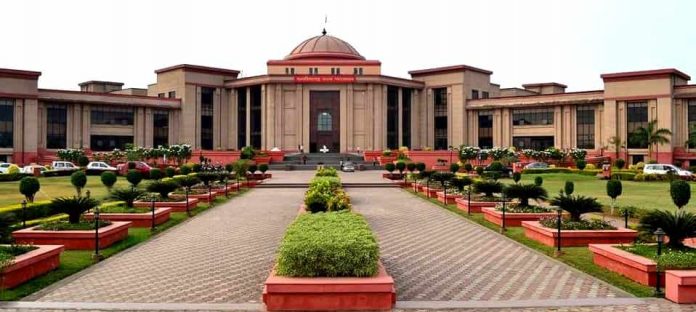ILNS: The Chhattisgarh High Court has strongly objected to the implementation of reservation in Covid-19 vaccination.
A PIL was registered suo motu by the division bench of Chief Justice PR Ramachandra Menon and Justice Parth Prateem Sahu because of various interlocutory applications with different prayers with regard to the conditions in jails amid the Covid-19 pandemic and also in respect of some Orders/Circulars issued by the Governmental authorities, whereby the benefit of ‘third phase’ vaccination (for the age group of above 18 years and below 45 years has been restricted, making a sub-classification without any power or competence for the State Government in this regard and contrary to the norms/guidelines issued by the Central Government in terms of the guidelines fixed by the World Health Organisation (WHO).
One of the PIL also challenged the Order/Circular dated April 30, 2021 issued by the Additional Chief Secretary, Government of Chhattisgarh, Health and Family Welfare Department,
stating that the third phase vaccination will be given first to the Antyodaya Card Holders – poorest among the poor, secondly to the people belonging to the group ‘Below Poverty Line’ and thirdly to the people belonging to the ‘Above Poverty Line’.
Ramakant Mishra, Assistant Solicitor General for the Union of
India, submitted that as per the vaccination policy, out of the total vaccines manufactured in India by Serum Institute of India –
Covishield and Bharat Biotech – Covaxin, 50 percent of the same has to be given to the Central Government and 50 percent has to be made available to the State Government.
It is stated that the vaccine is free to the persons coming within the first phase and second phase, whereas in respect of the third phase, it will be against payment. It is stated that the Central Government has set the State Government and the private hospitals at liberty to purchase the vaccines in the third phase directly from the
manufacturers against the price fixed by them.
It is further stated that the supply is being effected to various States based on the relevant parameters as contained in
the policy guidelines, adding that the demand/supply ratio is also having a bearing in this regard; more so being connected with the production/manufacturing capacity of the two manufacturers.
Satish Chandra Verma, Advocate General for the state, informed the Court that since only a limited quantity of vaccines is available for the third phase of vaccination, a sub-classification was
felt necessary, particularly since the Antyodaya Group who are residing mostly in the remote areas and who are rather illiterate or not knowing anything much about the Covid-19 pandemic, symptoms, complications, necessity to register in the
portal and as to the infrastructure, are moving around quite freely, which may spread the disease much faster. The case is almost similar to the case of the Below Poverty Line group as well and hence, there is a rationale in the sub-classification of persons in
the age group of 18 to 44.
The bench held that when the registration can be affected by the other people who can afford it by sitting at home, the poor people as may have to go to the nearest centers provided by the State to avail the facility. But by the time they reach there, the portal may be closed or the bookings/registration may be stopped having obtained saturation, virtually making it detrimental to the right
and interest of the children of the lesser God. This being the position, if any steps are taken by the State Government to have the benefit extended to such people as well, the object cannot be doubted. But, such step has necessarily to be in conformity with the constitutional mandate and in tune with the guidelines issued
by the Central Government at the national level.
The bench noted that “the ‘priority’ was fixed by the Central Government as per the guidelines/policy already declared. By virtue of the data gathered under the first wave, the ‘frontline workers’ like the Doctors, Nurses, and other ‘Corona Warriors’ who were having direct contact with the patients have been rightly
included in the top priority group. The next phase was for persons above 60 years and for persons with co-morbidities. The cut-off age of 60 was subsequently reduced to 45, maybe on the basis of subsequent data input. Now, under the third phase stage (for the persons between the age of 18 to 44) no distinction is
made and as per the policy all such persons have been treated as a common lot.
But, after the commencement of the second wave, the disease is spreading like ‘wildfire’, without any reference to the age factor and quite a lot of ‘young and healthy’ people have surrendered to the same. “
“Coming back to the sustainability of the impugned order and the need to protect the poor, illiterate and less fortunate citizens, a Scheme has to be formulated by the State by earmarking appropriate share of the vaccines to them as well and set up ‘Help Desks’ providing spot registration and to administer vaccines to them, without compromising the right of the other segments who are entitled to have equal treatment with regard to the right to life.”, the Court said.
The Court is of the view that “the State Government shall fix a reasonable ratio of allotment of vaccines to the ‘Antyodaya Group’, the persons belonging to the ‘Below Poverty Line’ and the persons belonging to the ‘Above Poverty Line’, with reference to all the relevant aspects including the vulnerability, chance to spread the disease and the number of eligible persons in the group”.
It was directed by the Court that the State Government to have a discussion of the Secretaries of the relevant Departments at the higher level and to fix the ratio as above and distribute the vaccines in the third phase of vaccination (for the age group of above 18 and below 45 years) in an equitable manner. The matter is fixed for May 7 for further hearing.


